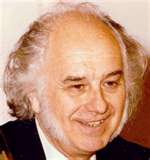Dr. Georgi Lozanov
Dr. Georgi Lozanov created a remarkably effective method of teaching based on how the brain actually learns.
A native of Sofia, Bulgaria, and a medical doctor specialized in psychiatry and psychotherapy, Dr. Lozanov has a passion for understanding how human beings learn. This led him to travel around the world to examine examples of super memory and learning achievements.
In 1966, he established the Suggestology Research Institute in Sofia to put his new system of teaching into practice.
Dr. Lozanov and his colleague, Dr. Evelyna Gateva, first applied the new methodology to the teaching of foreign languages, with astounding results. Students learned much faster than they had under traditional teaching methods, they retained the learning much longer, and they had a LOT more fun in class!

Suggestopedia: A New Way to Learn
Dr. Lozanov called his new methodology Suggestopedia. He developed the term by combining two words: suggestion and pedagogy. Dr. Lozanov chose this name because of his fundamental concern about the influence of suggestion in teaching. In doing so, he asked himself questions like:
- What message do we, as teachers, give our learners? That learning is easy and fun? Or that what we are teaching is so difficult they will never master the subject?
- What beliefs do learners bring with them about what is possible for them to accomplish?
- How can teachers help learners move beyond their limiting beliefs and discover their full human potential?
Suggestopedia made learning a pleasurable, natural process by:
- Incorporating music, art, role-playing and games into the curriculum.
- Placing great emphasis on the quality of the learning environment.
- Showing teachers how to create an emotionally safe and rich environment that motivates learners to expand their perspectives and increase their capacity to learn.
The Reserve Capacities of the Mind
Dr. Lozanov’s main concern was the mental, physical and spiritual health of the learner. His system not only allowed students to learn without trauma and stress, but it also helped them rediscover their natural thirst for learning.
In the process, learners uncovered previously hidden capacities and talents, which Lozanov called the reserve capacities of the mind.
The result was that students not only had fun learning, but that they also absorbed subject matter at greatly increased rates. In fact, the results were phenomenal. Students learned material 3 to 5 times faster than with “normal” teaching methods.
Suggestopedia Comes to North America
Georgi Lozanov's remarkable success with the teaching of foreign languages soon drew international attention. In 1975 Dr. Donald Schuster and Dr. Charles Gritton formed the Society for Accelerative Learning and Teaching (SALT) at Iowa State University.
As a result, the movement in the United States became known as either Accelerative or Accelerated Learning.
The organization experienced great success as it began teaching educators how to apply suggestion, relaxation and music to the learning process. It also readily absorbed new knowledge from cognitive scientists and pioneering educators.
The Principles Expand
As Dr. Lozanov was developing his methodology in Bulgaria, cognitive scientists and pioneering educators in America were also making great strides in understanding how the brain learns.
For example, Harvard professor Howard Gardner developed the theory of Multiple Intelligences, Dr. Antonio Damasio demonstrated how critical emotions are to learning, and University of California linguist John Grinder, in conjunction with psychology student Richard Bandler, began laying the foundation for Neuro-Linguistic Programming (NLP).
As a result, the Accelerated Learning movement in the United States embraced these new learnings and incorporated them into their best practices in teaching, training and development.
In 1994 SALT changed its name to the International Alliance for Learning in order to fully express the foundations of this expansion.
Dr. Georgi Lozanov Today
Dr. Lozanov has continued to develop his methodology and train teachers. Currently, he divides his time between Sofia, Bulgaria, and Vienna, Austria, where he directs the International Centre for Desuggestology.

Return Home from Dr. Georgi Lozanov



